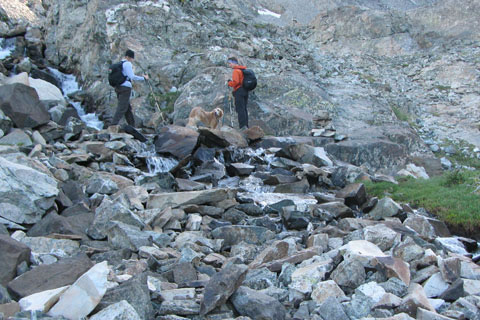| 415 | Motivation | 2011-06-10 |

The duo's misfortunes multiplied as the trail was harder than they expected, their packs were heavier than expected, and it rained one day.
Setting goals like walking part of the Appalachian Trail are difficult. It is difficult to set the bar at just the right height. You want to be challenged; but still, you want to reach the goal. You have to plan realistic goals and then have the right motivation to execute the objectives.
In the summer of 2009 we went to Colorado to climb the 54 fourteen thousand feet peaks. Prior to our departure we spent months planning and preparing for the trip. We trained physically to reach the anticipated fitness level required to climb the mountains. We researched each route of each peak so that we were familiar with the possible routes and the mountains. We painstakingly plotted the driving routes to each trailhead. Luckily we talked a few friends into joining us for parts of the trip. And, we researched and purchased new gear to use on the trip. Finally, we were ready to go.
Our training was almost perfect. After acclimating, the mountains were not overly difficult for our conditioning and experience. Our knowledge of the peaks made us comfortable on all of the climbs. The gear we bought was lightweight and worked well. And having our friends join us was a lifesaver.
The things we underestimated were the times it would take to drive from trailhead to trailhead and the energy we wasted on non-climbing activities. We truly loved each climb. We truly hated each drive. Luckily, we were never both down. One of us was always positive. We motivated and encouraged each other. We did complain about the driving and finding food, but not the mountains. Our other ace in the hole was our friends. They did not drive us; but when we were tired and ready to quit, they filtered water for us, took care of the dog, and brought pizza to camp. They cheered us to the finish. They helped motivate us.
Our pair of hikers on the Appalachian Trail, will probably learn from their trip. One of the hikers claimed to never want to hike again, whereas the other wanted to return to take care of unfinished business. After the soreness and fatigue of the trip ends and the hikers' memories change the misery of the trail in to experiences, then both hikers will probably want to return.
For success they should: set realistic goals, spend more time planning and preparing, physcially train for the rigors of the trail. They probably also need to lighten the loads in their backpacks. And above all they need to find ways to motivate each other. They cannot let their partner lose the will to walk.
Happy motivating trails.
Our reports from our Fourteener trip.